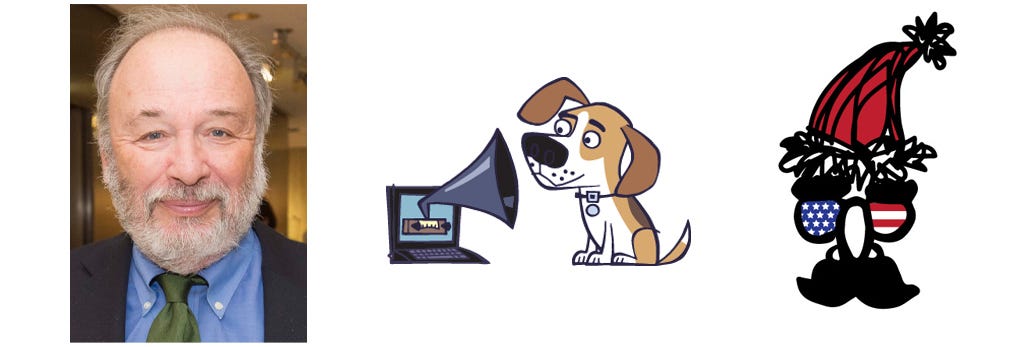Joe is a journalist, author, old-school blogger, and an old friend. He’s written seven books, most famously Primary Colors, and he was a longtime columnist for Time magazine. This year he launched a must-read substack called “Sanity Clause,” and he just started a podcast with the great John Ellis called “Wise Owls.”
You can listen to it right away in the audio player above (or on the right side of the player, click “Listen On” to add the Dishcast feed to your favorite podcast app). For two clips of our convo — on Trump getting more political savvy, and the NYT’s propaganda on domestic issues — pop over to our YouTube page.
Other topics: growing up in Queens; a grandfather who kept the books for Tammany Hall; how reporting on the busing crisis in Boston made Joe an independent; embedding with troops in Iraq and Afghanistan; James Bennet’s exposé of the NYT; a new study on how charter schools help black students; Daniel Patrick Moynihan and single-parent families; Trump’s “dictator on Day One” comment; how Never Trumpers never understand his success; the Trump trials; Biden’s age; his persistently dismal polling; Nikki Haley’s potential; Trump turning the GOP against neoconservatism; how eastern Ukraine is turning into WWI; how Putin’s devastated military is no threat to Europe; The Silk Roads by Peter Frankopan; Russiagate; how Larry Summers was right on inflation; Biden’s soft landing; Clinton balancing the budget; Boris and the Tories; tales from Joe’s 30 years of reporting on Israel and Palestine; his optimism on a two-state solution; how AIPAC has been “disastrous” for Israel; Daniel Finkelstein’s Hitler, Stalin, Mum and Dad; the Ivy League congressional hearings; DEI; why coddling Jewish students now is the wrong approach; Mao’s Cultural Revolution; the dregs of social media; the importance of civility and traditions; the Electoral College; the TV show The Crown; the Latin Mass; Pope Francis and the blessing of gay couples; the AIDS crisis; the PTSD of returning vets; and Joe’s bipartisan PAC for veterans called “With Honor.”
Browse the Dishcast archive for another convo you might enjoy (the first 102 episodes are free in their entirety — subscribe to get everything else). Coming up: Carole Hooven returns to talk about her tribulations at Harvard, Alexandra Hudson on civility, and Jennifer Burns on her new biography of Milton Friedman. Please send any guest recs, dissent and other comments to dish@andrewsullivan.com.
On our recent episode with David Leonhardt on the dwindling American Dream, a listener writes:
Another amazing conversation. I’m a naturalized American from a Latin American country. I am American, period, when I’m on this side of the border. (I say the opposite when I’m in Mexico.) If I must be lumped into a group, I connect best with other very high-income university graduates regardless of background.
Another listener on Leonhardt:
Wonderful interview. But as we discuss the growing distrust around us, I seldom hear discussion about the limitations of government. Liberals believe government can solve all the world’s ills. My limited experience is that a government that tries to serve 300 million very diverse people simply can not do that. And the problem is that someone like Biden tries to build the expectation that government can do that. It leaves many disappointed people in the wake, leading to some of the conversation you had with Leonhardt.
As liberals, we need to appreciate the limitations of government. The limitations are real, and deeply frustrating to the people who need the help. It leaves people confused, frustrated and deeply angry. Conservatives are right to challenge what is possible and we liberals need to listen. If we do not, we sell wares that simply can not be delivered.
One more reflection on the Leonhardt pod:
Like most of your moderately liberal guests, Mr. Leonhardt advocates for increased spending on things like infrastructure, research & development, education, and social programs. I would be really curious to hear some of the guests tackle the issue of why our domestic spending seems to be so woefully inefficient. In my experience, most people think America has a meager welfare state. In fact, we spend a greater percentage of our national income on transfer payments to the bottom 50% of earners than does any European country.
Their confusion is understandable, though, because we seem to get so little bang for our buck. A number of European countries can manage to provide free college tuition and healthcare, while we don’t even get close. We spend the second most on education per pupil in the world, and it’s hard to say that the results have been anywhere near what most Americans have every right to expect.
If you had told me that we would spend a combined $1.7 trillion over 13 years on the American Recovery and Reinvestment Act and the Inflation Reduction Act — to say nothing of the hundreds of billions otherwise spent on green energy — I likely would have supported it. However, I would have just assumed that it would result in some monumental achievements, such as nearly every building in the country being powered by renewable energy. Obviously, there was a lot of good that came from these spending measures, but nowhere near what I would have expected. By contrast, in inflation-adjusted dollars, the interstate highway system was built at a cost of only about $550 billion. And it is beyond me that a state like California could spend over $120 billion on high-speed rail and not have laid an inch of track.
I do believe that more Americans would support greater investments, but that would require a whole lot more credibility, in terms of the money going somewhere noticeable and productive. Of course, we can (and should) raise taxes. But we are also $33 trillion in debt, adding over $1.5 trillion per year, and facing an ocean of unfunded liabilities. One could argue that this is the time for austerity instead of ramping up spending. It will be difficult to seriously address our deficit, let alone increase federal spending, without raising taxes on a middle class that has already been squeezed by inflation and stagnant wages. And no serious person would deny that increased taxes will have at least some negative impact on growth.
Some on the right blame our labyrinthine bureaucracy for the inefficient spending, but I don’t know that it’s any worse than that of European Union countries. Others blame special interests and corruption. I have no idea how much of an effect things like that have, but it’s hard not to be cynical when you see 4000-page omnibus bills that read like Christmas gift lists of payments to one favored entity after another.
Here’s a listener on the episode with Cat Bohannon on evolution and women:
I was heartened to hear you make it clear to Bohannon why the word “queer” is so deeply disturbing for many gay men like you and me. This is an issue that should be talked about more because most people who are not aware of gay culture don’t understand the difference and, sadly, I find they get hoodwinked into thinking queer is the default term everyone likes.
When I was a graduate student in 2011, I created an intergenerational theater project with gay men and lesbian women ages 60 and up and gay men and lesbian women 18 to 27. The idea was to bring these two age groups together to create a theater piece inspired by generational differences and similarities. Many of the older adults being homosexual didn’t have children of their own, so they were craving connection with the younger generation. But it should come as no surprise to you that the main source of contention was the word “queer.” When the older adults tried to sincerely explain to younger ensemble members how painful that word was to them, the young adults used the same rhetoric Bohannon used on you: “Oh, well OUR generation uses queer because it’s more inclusive … ”
It was crushing to watch those young people behave in such an insensitive manner every time it happened, so I was very happy to hear you let Bohannon know exactly how intentionally divisive and cruel that word is. We should all be more frank with our peers, and I hope your example lets people see it’s OK to speak freely.
Just from today in the WokePo:
In Russia, where the entire LGBTQ+ community has been banned as “extremist,” some parents are paying thugs to abduct their queer sons and daughters, forcing them into secure private centers to “cure” them with so-called conversion therapy.
This is propaganda. I can guarantee you that in Russia, of all places, gay men and lesbians are not calling themselves “queer.” Even in the US, Gallup recently polled gay men, lesbians, and transgender people on what they called themselves. Only 4.3 percent chose the word “queer” or something similar. Yet the critical queer theorists have somehow persuaded the US MSM that this is the right term for gay men, lesbians and trans people. It isn’t. Over 95 percent of us disagree. It’s either a slur or a deliberate and malign ideological cooptation of the majority of non-extremist, non-queer gay men and lesbians.
Here’s a guest rec for a future episode:
Wow, did I enjoy that conversation with Matthew Crawford! Just wonderful.
Also, I suggest contacting Christopher Beha, a memoirist and novelist who I’d never heard of until I read his essay in today’s NYT. I could see you and Beha having a wonderful conversation. He describes my Catholic(ish) spirituality so very well. Here’s a quote from his essay that perfectly encapsulates my feelings about “religious/spiritual vs. atheist” types:
I sometimes think that the modern world’s true cultural divide is not between believers and unbelievers but between those who think life is a puzzle that is capable of being solved and those who believe it’s a mystery that ought to be approached by way of silence and humility.
Yes. The other critical figure is Christian Wiman. Another guest rec:
I’d really like to hear you have a discussion with Cass Sunstein of Harvard Law School. Very bright guy. Incredibly productive scholar. Some topics I’d love to hear discussed: originalism; the Second Amendment; Trump and his current trials; insurrection; abortion and Dobbs; the current state of the federal judiciary; free speech; and regulation of the Internet. And of course he’s written on behavioral economics and the “nudge” — setting up default rules to advance social policies.
One more rec:
I’m not sure if you know Tim Urban, who writes the absolutely fascinating blog waitbutwhy.com (my second favorite of all time, only to the Dish). I’m reading his book What’s Our Problem? A Self-Help Book for Societies, which is largely about the illiberalism of wokeness. He writes incredibly well, and it’s right up your alley (and increasingly mine). He would probably be an amazing person to have on your podcast.
Cool. An amazing artist writes:
Please accept my deepest condolences on the recent passing of your beautiful dog, Bowie. I know what it feels like to lose a beloved friend and companion.
I realize this is very personal, so forgive me if this is an overstep, but after seeing your post last night on Instagram, I felt compelled to make a drawing of Bowie based on one of your photos. I’m an artist who draws animals and I was both heartbroken for you and captivated by Bowie’s soulful eyes:
That’s incredibly life-like! A Ptown neighbor, who loved Bowie, painted this beautiful portrait:
The three legs are what make it!
From a Jewish father:
Your December 8 column on the Ivy League presidents finally convinced this longtime lurker to become a paid subscriber. While I still feel most normal people basically agree with your thoughts on identity ideology and its current embrace of anti-Semitism, we need more people to come out and call it what it is: evil.
It’s also an incredibly stupid strategy!
Listen to this episode with a 7-day free trial
Subscribe to The Weekly Dish to listen to this post and get 7 days of free access to the full post archives.















